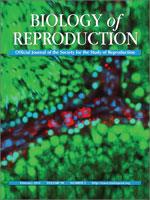Approximately 30% of infants in the United States are exposed to high doses of isoflavones resulting from soy infant formula consumption. Soybeans contain the isoflavones genistin and daidzin, which are hydrolyzed in the gastrointestinal tract to their genistein and daidzein aglycones. Both aglycones possess hormonal activity and may interfere with male reproductive development. Testosterone, which supports male fertility, is mainly produced by testicular Leydig cells. Our previous studies indicated that perinatal exposure of male rats to isoflavones induced proliferative activity in Leydig cells and increased testosterone concentrations into adulthood. However, the relevance of the neonatal period as part of the perinatal window of isoflavone exposure remains to be established. The present study examined the effects of exposure to isoflavones on male offspring of dams maintained on a casein-based control or whole soybean diet in the neonatal period, that is, Days 2 to 21 postpartum. The results showed that the soybean diet stimulated proliferative activity in developing Leydig cells while suppressing their steroidogenic capacity in adulthood. In addition, isoflavone exposure decreased production of anti-Müllerian hormone by Sertoli cells. Similar to our previous in vitro studies of genistein action in Leydig cells, daidzein induced proliferation and interfered with signaling pathways to suppress steroidogenic activity. Overall, the data showed that the neonatal period is a sensitive window of exposure to isoflavones and support the view that both genistein and daidzein are responsible for biological effects associated with soy-based diets.
How to translate text using browser tools
22 January 2014
Testicular Development in Male Rats Is Sensitive to a Soy-Based Diet in the Neonatal Period
India D. Napier,
Liz Simon,
Devin Perry,
Paul S. Cooke,
Douglas M. Stocco,
Estatira Sepehr,
Daniel R. Doerge,
Barbara W. Kemppainen,
Edward E. Morrison,
Benson T. Akingbemi
ACCESS THE FULL ARTICLE

Biology of Reproduction
Vol. 90 • No. 2
February 2014
Vol. 90 • No. 2
February 2014
androgen
androgens/androgen receptor
daidzein
endocrine disruptors
genistein
Leydig cells
phytoestrogen




